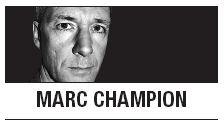Yulia Tymoshenko, Ukraine’s most famous political prisoner, cut a frail and diminished figure when she emerged from jail last weekend to address the crowd on Kiev’s Independence Square from a wheelchair. They were less than ecstatic, but don’t count her out. She is one of the world’s truly tough women.

What to do about Tymoshenko will be one of many difficult questions for Ukraine, assuming the country doesn’t first descend into civil war. On her release, she told Ukrainian reporters she would run for president in elections May 25. Later, though, her aides said she was undecided. It’s easy to see why she may be recalculating: The world changed while she was incarcerated. What happened in Ukraine over the last few months was not the Orange Revolution that she rode to power in 2004. It was an angrier, more skeptical affair.
Tymoshenko is charismatic and polarizing. Her past as the billionaire “Gas Princess” of the 1990s makes her an unlikely champion of a revolution against corruption. She was a political prisoner of the old regime, and yet as a two-time former prime minister she is also seen as part of that old regime. She is hated by some for being too close to Russia, and by others for provoking Ukraine’s powerful eastern neighbor. While other opposition leaders were with the protesters in Kiev’s Independence Square, she was absent, ailing behind bars.
Still, at a time of concern that right-wing populists may emerge from the streets to take the reins in Kiev, sparking civil conflict, Ukraine may need her sheer drive.
While at university in the 1980s, the petite Tymoshenko worked stacking tractor tires as big as she was. In 1989, when it became possible in the former Soviet Union to open a legal business, she developed a small chain of video rental stores. After 1991, when the Soviet empire collapsed and created an essentially cashless society, she started bartering goods for oil from a refinery.
When she got cut out of that deal by new management, Tymoshenko decided to try her hand at the natural gas business. Ukraine at the time owed OAO Gazprom $2.5 billion in unpaid gas bills, and the Russian company was stuck supplying a country that couldn’t, or wouldn’t, pay. She put on a miniskirt and jackboots and went to see Gazprom’s then-boss in Moscow, Rem Vyakhirev. She left with a deal to buy 20 billion cubic meters of gas per year, about a quarter of Ukraine’s total consumption.
That the $80 per thousand cubic meters Tymoshenko had to pay Gazprom was the same as the mandatory sale price to Ukrainian companies didn’t faze her. Since this was a barter economy, she could make money by reselling the goods with which she was paid. She made a lot of money. She made even more once the governor of her home region of Dnipropetrovsk, Pavlo Lazarenko, became prime minister and she took her gas business national.
When I spoke with her about this some years ago, Tymoshenko evaded the question of whether her company had bribed Lazarenko. Documents produced during Lazarenko’s California trial (and conviction) for money laundering and wire fraud suggested her company paid him $100 million in kickbacks. She implied, though, that she had cleaned up her act and sought to change the system, whereas others had not.
Tymoshenko’s rivals say she went into politics solely with a view to once again “sit on the pipe,” as the business of extracting rent from Ukraine’s position as a gas transit country is described. But I think Tymoshenko’s political ambitions were about much more than money. Her home, outside Kiev, was well made but modest compared to Yanukovych’s residence. There was no zoo, no classic-car collection. She acknowledges that her first attempt at the prime minister’s job, when she fell out with former President Viktor Yushchenko, failed because of her own excess aggression: “I was the only warrior in the field,” she said.
I don’t think Tymoshenko would be the right choice for Ukraine’s next president. No one, whether they are pro-Russian or pro-European, will be able to see her as representing a fresh start. Vitaly Klitschko, the former heavyweight boxing champion of the world, would be a much more plausible candidate; he’s rich and tough, too, and he’s clean.
Still, Tymoshenko remains a force worth harnessing. Her ambiguity as a Russian-speaking pro-European with appeal in western Ukraine, her profile abroad and her relationship with Moscow could prove useful.
By Marc Champion
Marc Champion is a Bloomberg View editorial board member. ― Ed.





![[Exclusive] Hyundai Mobis eyes closer ties with BYD](http://res.heraldm.com/phpwas/restmb_idxmake.php?idx=644&simg=/content/image/2024/11/25/20241125050044_0.jpg)
![[Herald Review] 'Gangnam B-Side' combines social realism with masterful suspense, performance](http://res.heraldm.com/phpwas/restmb_idxmake.php?idx=644&simg=/content/image/2024/11/25/20241125050072_0.jpg)

